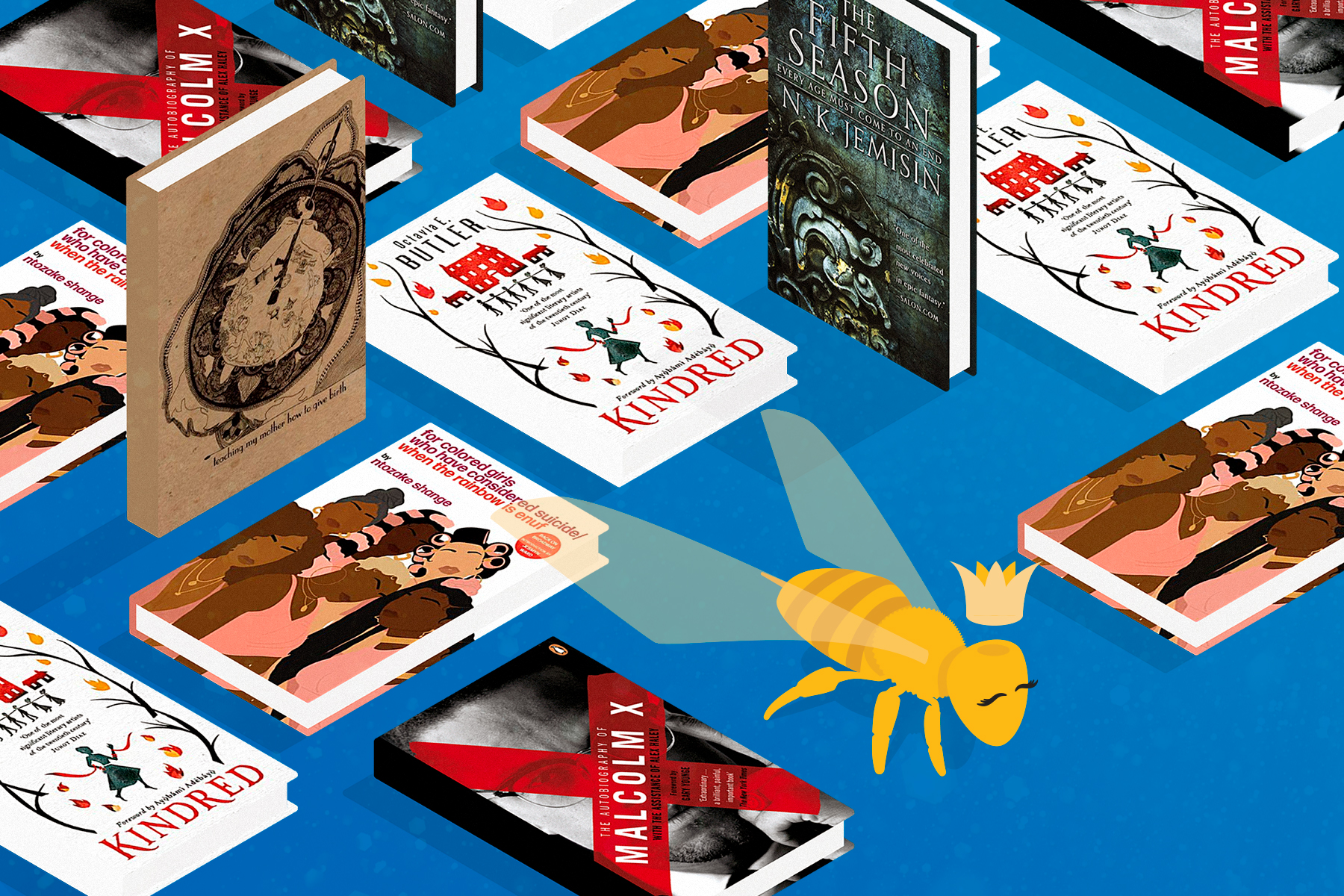Beyoncé: a literary guide

Beyoncé is back and she’s ushering in a renaissance. Six years on from her last proper solo record, 2016’s Lemonade, the mononymous musical icon released her glorious new dance record, RENAISSANCE – and now she's taking it on tour across the UK and the world.
Beyoncé has said that her new record is all about being free and adventurous, away from “perfectionism and overthinking”. However, this is Queen Bey we’re talking about, and if her past few albums are anything to go by, RENAISSANCE and any accompanying visuals will be stuffed with cultural references and intertextual nuggets. It’s something she’s filled her art with since before she changed the world following that digital drop in 2013 with the release of her self-titled visual album, but was most notable on her opus Lemonade, an affirming and career-defining visual album. It’s a record that has inspired its own syllabus, curated by writer, theologian and educator Candice Benbow, and a course at the University of Texas.
Inspired by Benbow’s incredible work, we wanted to put together our own Beyoncé-related reading list, featuring works cited by the singer, as well as those we believe make perfect bedfellows for Queen Bey’s back catalogue, to set you up for the RENAISSANCE tour.
We Should All Be Feminists by Chimamanda Ngozi Adichie (2014)
When Beyoncé stood on stage with the word “FEMINIST” emblazoned behind her at the 2014 MTV Video Music Awards, she helped usher feminism into the mainstream – as the writer Roxanne Gay wrote on Twitter at the time: “For better or worse, that reach is WAY more than anything we’ve seen.” Accompanying Beyoncé’s declaration was a sample from Chimamanda Ngozi Adichie’s 2011 TEDx talk, titled “We Should All Be Feminists”, where the Nigerian writer goes on to define feminism in the 21st Century. That sample had previously appeared on “***Flawless”, a song taken from Beyoncé’s game-changing self-titled album, released in 2013. It only makes sense, then, to include that TEDx talk, published as a book-length essay in 2014, on this reading list.
Lemonade was an artistic tour-de-force. A meditation on infidelity, the lasting implications of slavery, inherited trauma and motherhood, it peels back the curtain a little and provides a glimpse at the life and struggles of one of pop’s most enigmatic and private stars. To fully appreciate the artistic intent of Lemonade, however, you must soak up its visuals. Weaving throughout the film are adapted passages from poems by Somali-British poet Warsan Shire, narrated by Queen Bey herself. The excerpts from Shire’s poems, which often reference sex, infidelity, depression, religion and addiction, make the perfect companion to Lemonade’s spiritual, sexual and political iconography. If you liked Shire’s debut collection, then check out her most recent one, too: Bless the Daughter Raised by a Voice in Her Head, released earlier this year.
Autobiography of Malcolm X by Malcolm X (1965)
“The most disrespected person in America is the black woman. The most unprotected person in America is the black woman. The most neglected person in America is the black woman.” This Malcolm X quote – taken from what is known as the “Who Taught You to Hate Yourself?” speech given at the funeral of Ronald Stokes, a Nation of Islam member who was killed by the LAPD in 1962 – feels like the thematic bedrock of Lemonade, and a sample even appears in the visual album. There are visual references to Malcolm X, the Nation of Islam and the Black Panthers peppered throughout Beyoncé’s work, too. Basically, The Autobiography of Malcom X is essential reading for any of the musician’s devotees.
The Fifth Season by N.K. Jemisin (2015)
Motherhood and family are themes that appear throughout Beyoncé’s later work, with songs such as “Blue” and “Lovehappy”, taken from Beyoncé and Jay Z’s 2018 joint album EVERYTHING IS LOVE, both referencing her children. Similarly focused on motherhood and family is N.K. Jemisin’s Hugo award-winning Broken Earth trilogy. The first book, The Fifth Season, is an extraordinary feat of speculative fiction. Set in a fantasy world called the Stillness, a land plagued by apocalyptic levels of destruction and imbalance, the novel follows three converging narratives, including the story of Essun, a mother and orogene, which means she can harness the power of the world around her with devastating consequences. It’s a novel about identity, grief and discrimination, and resonates deeply with albums such as Lemonade and the Afrofuturism of Beyoncé’s 2020 visual album, Black Is King.
Kindred by Octavia Butler (1979)
The themes of familial trauma and lasting implications of slavery feel integral to Lemonade. They are also woven into Octavia Butler’s masterpiece, Kindred. The book follows Dana, an African-American woman who, following her 26th birthday, is pulled back in time to antebellum Maryland, where she encounters her ancestors and becomes embroiled in life on the plantation. The novel’s non-linear plot and the inclusion of time travel allows Dana to reassess her identity in the context of her familial and cultural history, a merger that Beyoncé also appears to be engaged in – especially with her later work.
For Colored Girls Who Have Considered Suicide When the Rainbow is Enuf: A Choreopoem by Ntozake Shange (1975)
Throughout her career, Beyoncé has always strived to portray the complexity, diversity and shared experiences of Black women living in America. While songs like “Run The World (Girls)”, “Formation” and “Freakum Dress” were designed to empower, tracks such as “1+1”, “If I Were A Boy” and “Pray You Catch Me” were more vulnerable, the often infallible Queen Bey laying out her insecurities for the world to see. Ntozake Shange’s choreopoem similarly provides a kaleidoscopic portrait of the Black womanhood. Like Beyoncé’s later work, it explores the effects of sexism, racism and systemic oppression, the seemingly disparate but ultimately connected poetic monologues coalescing to provide a complex and realistic depiction of the experiences of African-American women.